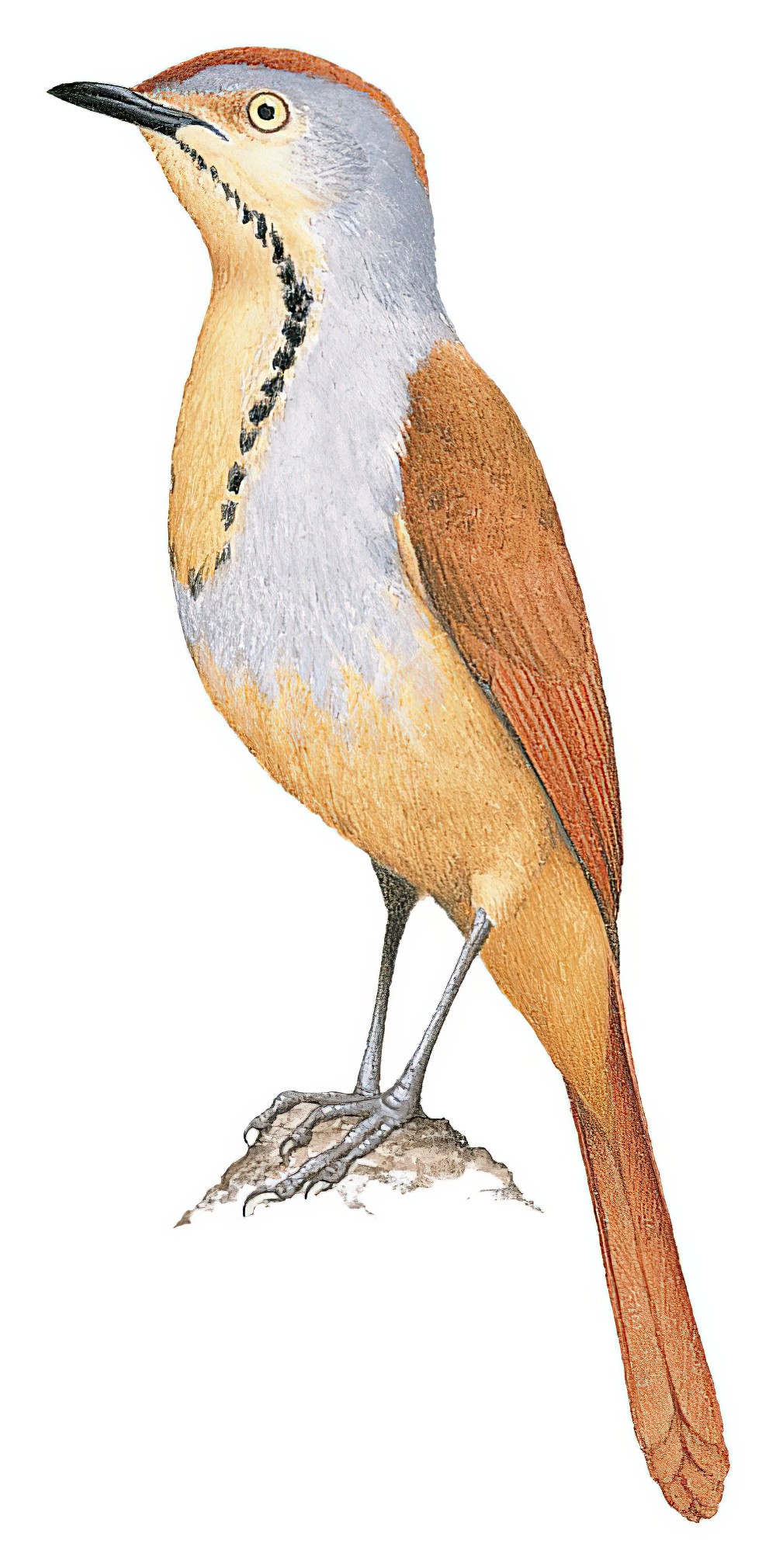Collared Palm-Thrush / Cichladusa arquata

Collared Palm-Thrush
SCI Name:
Protonym: Cichladusa arquata Monatsb.K.Akad.Berlin p.134
Taxonomy: Passeriformes / Muscicapidae / Cichladusa
Taxonomy Code: copthr1
Type Locality: Sena, near the Zambezi, Mozambique [reference not verified] .
Author: Peters, W
Publish Year: 1863
IUCN Status: Least Concern
DEFINITIONS
CICHLADUSA
(Muscicapidae; Ϯ Collared Palm Thrush C. arquata) Gr. κιχλη kikhlē thrush; αδουσα adousa singer < αειδω aeidō to sing; "Hr. W. Peters gab die Charakteristik einer neuen Gattung drosselartiger Singvögel, Cichladusa, aus Mossambique. Cichladusa nov. gen.*) Diese Gattung stimmt durch die Bildung der Schwung- und Steuerfedern, so wie durch die gestiefelten Tarsen überein mit Bessonornis, unterschiedet sich aber von ihr, abgesehen von dem stärkeren Schnabel und den steifen, kammförmigen Federn der Vorderstirn, durch die nicht spaltförmigen sondern rundlichen Nasenlöcher. Cichladusa arquata nov. spec. ... Dieser Vogel ist von mir bei Sena, in der Nähe des Zambeze, erlegt worden, wo er den einheimischen Namen nhamtambue (spr. njamtambue) führt und als der beste Sänger berühmt ist. Er hält sich auf hohen Bäumen, am Rande lichterer Waldungen auf. ... *) κιχλη, Drossel, αδουσα, Sängerin. " (W. Peters 1863); "Cichladusa Peters, 1863, Monatsb. Kön. Akad. Wiss. Berlin, p. 134. Type, by original designation, Cichladusa arquata Peters." (Ripley in Peters, 1964, X, p. 60).
arquata
● L. arquatus or arcuatus bow-shaped < arquus or arcus bow, rainbow (syn. Calidris ferruginea, Cichladusa, Erythropitta).
● Med. L. arquata curlew < L. arcuatus bow-shaped < arcus bow; “It is generally said ...to be derived from the bird’s bill being bent like a bow, arcus; but it more likely refers to arquatus morbus = the jaundice “when the skin turns to the yellow colour of the rainbow” in allusion to the legend about Charadrius, Galbula, Icterus, etc.” (BOU 1915); "77. SCOLOPAX. ... Arquata. 5. S. rostro rostro arcuato, pedibus cærulescentibus, alis nigris maculis niveis. Fn. svec. 139. Numenius s. Arquata. Gesn. av. 222. Aldr. orn. l. 20. c. 21. Will. orn. 216. t. 54. f. 1. 2. Raj. av. 103. Alb. av. I. p. 75. t. 79. Mars. danub. . . t. 17. Habitat in Europa." (Linnaeus 1758) (Numenius).
Arquata
• (Scolopacidae; syn. Numenius † Eurasian Curlew N. arquata) Med. L. arquata curlew < L. arcuatus bow-shaped < arcus bow; "ARQUATA cinerea. Flamant gris. Il faut placer cet oiseau sous le genre d'Arquata avec Gesner un des plus sçavans hommes de son siécle, à qui l'histoire naturelle est si rédevable. Arquatam, dit-il, hanc avem latine vocare volui, quod rostrum ejus inflectatur instar arcus Gesn. de avibus lib. 3. p. 196. On donne à Cayenne le nom de Flamant à toutes ces especes d'Arquata; mais le véritable Flamant est le Phœnicopterus dont nous parlerons plus bas" (Barrère 1741); "2612. NUMENIUS, L. 1746. Numenius, p., L. 1735. Tantalus, Lacép. 1800-1. Cractiornis, G. R. Gr. 1841. Arquata, Barr. 1745. G. of B. iii. p. 569. pl. 153; Reich. S. A. t. 14. f." (G. Gray 1871); "Arquata G. Gray, 1871, Hand-list Genera Species Birds, III, p. 42. Type, by original designation and tautonymy, Arquata Barr., i.e. Scolopax arquata Linnaeus, 1758." (JAJ 2021).
• (Numididae; syn. Numida † Helmeted Guineafowl N. meleagris) L. arquatus bow-shaped, curved < arquus or arcus bow, rainbow; "Als Sippe hieher: Perlhuhn (Arquata (Nob.) oder Numida Meleagris). Schnabel kurz, dick; Scheitel mit Knochenhöcker oder Federbusch. Füße unbefiedert, ungespornt. Schieferfarbig, mit weißen Fleckchen ganz besäet; Kopf und Halshaut blaulich. In Afrika (Guinea) heerdenweis." (Gistel 1848); "Arquata Gistel, 1848, Naturgesch. Thierreichs für höhere Schulen, p. 92. Alternative name for Numida Linnaeus, 1766." (JAJ 2020).
UPPERCASE: current genus
Uppercase first letter: generic synonym
● and ● See: generic homonyms
lowercase: species and subspecies
●: early names, variants, mispellings
‡: extinct
†: type species
Gr.: ancient Greek
L.: Latin
<: derived from
syn: synonym of
/: separates historical and modern geographic names
ex: based on
TL: type locality
OD: original diagnosis (genus) or original description (species)












